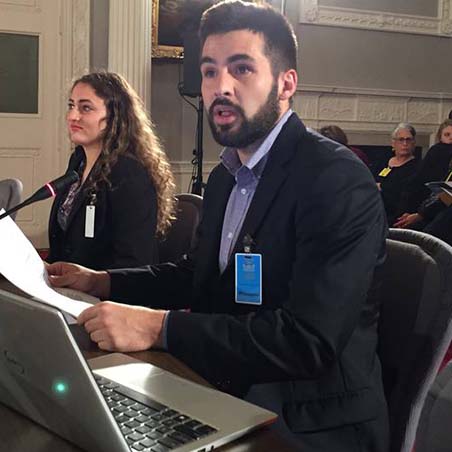Harry Critchley
Law Student, Schulich School of Law
Bachelor of Arts (Hons), Religious Studies and Contemporary Studies, 2015
If you have the ability to do something you have a responsibility to do it.
“Once you start to have meaningful connections with people in jail, it is really hard to turn away from them. These are people who have been systematically failed by society.”
Harry made those “meaningful connections” through the likes of Aristotle and Sophocles.
This is how it went. After his first two years at King’s Harry spent the next year studying at Oxford University. He came back to King’s to finish up his degree, but he says his enthusiasm for the liberal arts had waned. At least it had until a friend suggested he volunteer with the Halifax Humanities Society. It offers university level non-credit courses for people on low incomes.
“That turned things around for me in a big way. People who were isolated by illness or by poverty were able to read these texts and come together and have really powerful conversations.”
That led Harry to opening “the black box” of the corrections system.
“In my last year at King’s I got really involved in working in the provincial jails. We took the Halifax Humanities program and taught it in the Burnside jail in Dartmouth as the Burnside Education Program.”
Harry says they would meet in a tiny windowless room around a table. It was like a book club. He remembers one day they were reading the play Philoctetes by Sophocles in which the hero, abandoned on an island, feels alone, without a friend in the world.
“So, we had one guy who said—this is exactly how I feel. I feel alone all the time, I feel incredibly isolated. And then everyone else in the class chimed in and said yeah, that’s how I feel too. It was such a beautiful moment of vulnerability. We’re in a place of hyper-masculinity and they are talking about feeling lonely, missing their kids.”
The Burnside Education Program, at the request of the inmates, morphed. Harry and the others running the program started offering basic literacy classes and high school math.
As Harry says, “Once you learn about the corrections system it’s like—if you have the ability to do something you have a responsibility to do it.”
Harry took a couple of years off school to continue with the program. He also worked at Dalhousie University helping profs in the Faculty of Arts set their students up with work experience in the community. He then helped set up the Limitless program for the Nova Scotia Community College (NSCC). Harry was uniquely qualified. Limitless brings NSCC courses to people in jail.
While working on Limitless Harry earned his Master’s degree from Queen’s University. He is now a student in Dalhousie’s Schulich School of Law. He has his sights set on working for Legal Aid in rural Nova Scotia…
“That’s what the humanities are all about. When you read Plato and Aristotle and all the others, you learn to appreciate different ways of seeing the world. That’s what I learned at King’s and that is what I take to all the work I do. You got to meet people where they are with their own unique set of experiences and their own view of the world.”
Editorial note—Harry Critchley, 32, passed away unexpectedly in February 2025. In a note to the King’s Community, President Bill Lahey wrote, “Harry was a one-of-a-kind outstanding student who exemplified the very best of what all our students bring to King’s and take into the world from King’s.”
 Connect with Harry Critchley
Connect with Harry Critchley